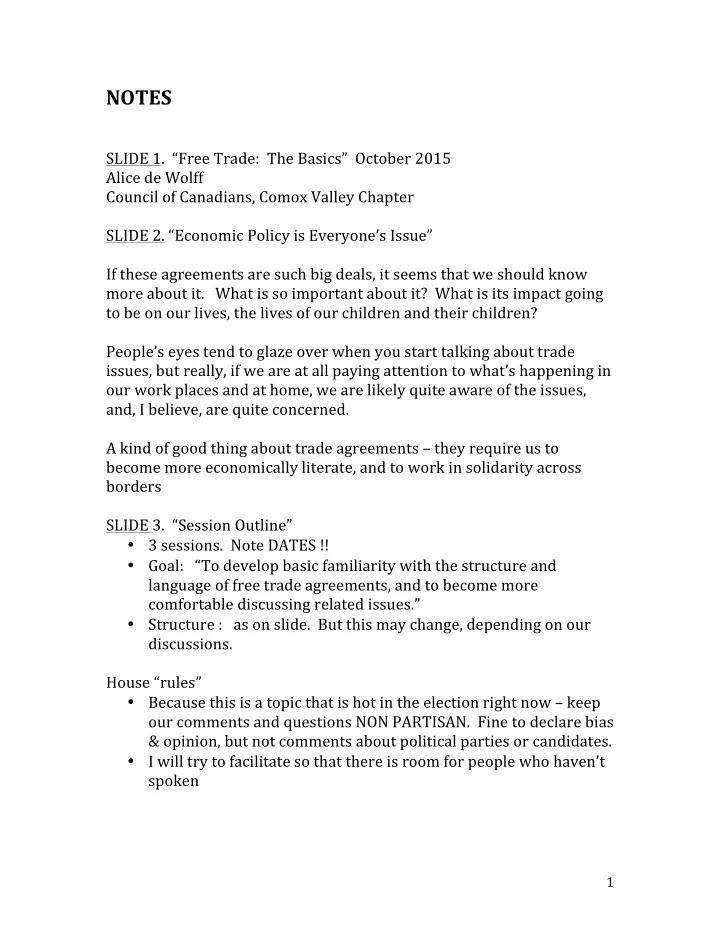

NOTES ¡ ¡ ¡ SLIDE ¡1. ¡ ¡“Free ¡Trade: ¡ ¡The ¡Basics” ¡ ¡October ¡2015 ¡ Alice ¡de ¡Wolff ¡ Council ¡of ¡Canadians, ¡Comox ¡Valley ¡Chapter ¡ ¡ SLIDE ¡2. ¡“Economic ¡Policy ¡is ¡Everyone’s ¡Issue” ¡ ¡ ¡ If ¡these ¡agreements ¡are ¡such ¡big ¡deals, ¡it ¡seems ¡that ¡we ¡should ¡know ¡ more ¡about ¡it. ¡ ¡ ¡What ¡is ¡so ¡important ¡about ¡it? ¡ ¡What ¡is ¡its ¡impact ¡going ¡ to ¡be ¡on ¡our ¡lives, ¡the ¡lives ¡of ¡our ¡children ¡and ¡their ¡children? ¡ ¡ People’s ¡eyes ¡tend ¡to ¡glaze ¡over ¡when ¡you ¡start ¡talking ¡about ¡trade ¡ issues, ¡but ¡really, ¡if ¡we ¡are ¡at ¡all ¡paying ¡attention ¡to ¡what’s ¡happening ¡in ¡ our ¡work ¡places ¡and ¡at ¡home, ¡we ¡are ¡likely ¡quite ¡aware ¡of ¡the ¡issues, ¡ and, ¡I ¡believe, ¡are ¡quite ¡concerned. ¡ ¡ ¡ ¡ ¡ A ¡kind ¡of ¡good ¡thing ¡about ¡trade ¡agreements ¡– ¡they ¡require ¡us ¡to ¡ become ¡more ¡economically ¡literate, ¡and ¡to ¡work ¡in ¡solidarity ¡across ¡ borders ¡ ¡ SLIDE ¡3. ¡ ¡“Session ¡Outline” ¡ • 3 ¡sessions. ¡ ¡Note ¡DATES ¡!! ¡ • Goal: ¡ ¡ ¡“To ¡develop ¡basic ¡familiarity ¡with ¡the ¡structure ¡and ¡ language ¡of ¡free ¡trade ¡agreements, ¡and ¡to ¡become ¡more ¡ comfortable ¡discussing ¡related ¡issues.” ¡ • Structure ¡: ¡ ¡ ¡as ¡on ¡slide. ¡ ¡But ¡this ¡may ¡change, ¡depending ¡on ¡our ¡ discussions. ¡ ¡ House ¡“rules” ¡ • Because ¡this ¡is ¡a ¡topic ¡that ¡is ¡hot ¡in ¡the ¡election ¡right ¡now ¡– ¡keep ¡ our ¡comments ¡and ¡questions ¡NON ¡PARTISAN. ¡ ¡Fine ¡to ¡declare ¡bias ¡ & ¡opinion, ¡but ¡not ¡comments ¡about ¡political ¡parties ¡or ¡candidates. ¡ ¡ ¡ ¡ • I ¡will ¡try ¡to ¡facilitate ¡so ¡that ¡there ¡is ¡room ¡for ¡people ¡who ¡haven’t ¡ spoken ¡ ¡ ¡ ¡ 1 ¡
Introductions ¡ • Who’s ¡in ¡the ¡room? ¡ ¡Who ¡has ¡been ¡active ¡on ¡trade ¡issues? ¡ • I ¡started ¡working ¡on ¡this ¡issue ¡in ¡the ¡mid-‑1980s ¡, ¡when ¡NAC ¡ began ¡to ¡comment ¡on ¡economic ¡policy ¡…. ¡immigrant ¡women ¡& ¡the ¡ loss ¡of ¡Canada’s ¡garment ¡industry ¡ ¡ SLIDE ¡4. ¡ ¡Basics ¡ ¡ SLIDE ¡5. ¡ ¡Basics. ¡Free ¡Trade ¡ • What ¡is ¡“Free ¡Trade”? ¡ ¡The ¡exchange ¡of ¡goods ¡across ¡national ¡ boundaries ¡at ¡the ¡‘natural’ ¡price ¡of ¡production, ¡without ¡tariffs, ¡ quotas, ¡or ¡subsidies. ¡ ¡ ¡ ¡ ¡ ¡ • ¡ SLIDE ¡6. ¡ ¡Basics. ¡Fair ¡Trade ¡ • “Fair”Trade is different - a trading partnership, based on dialogue, transparency and respect, that seeks greater equity in international trade. It contributes to sustainable development by offering better trading conditions to, and securing the rights of, marginalized producers and workers. Fair Trade Organizations, backed by consumers, are engaged actively in supporting producers, awareness raising and in campaigning for changes in the rules and practice of conventional international trade. ¡ SLIDE ¡7: ¡What’s ¡in ¡a ¡Free ¡Trade ¡Agreement? ¡(Blank) ¡ ¡ Discussion: ¡ ¡What ¡do ¡YOU ¡think ¡is ¡in ¡a ¡trade ¡agreement? ¡ ¡ SLIDE ¡8: ¡ ¡What’s ¡in ¡a ¡Free ¡Trade ¡Agreement? ¡ ¡ • Removing ¡“barriers” ¡to ¡trade ¡between ¡parties ¡ • “Barriers“ ¡traditionally ¡have ¡meant ¡tariffs ¡and ¡quotas ¡that ¡ countries ¡place ¡on ¡certain ¡goods ¡or ¡industrial ¡sectors ¡ • Agreements ¡on ¡which ¡goods ¡/ ¡industrial ¡sectors ¡will ¡be ¡affected ¡ (fish, ¡cheese, ¡oil, ¡diamonds, ¡wheat, ¡etc.) ¡ ¡ SLIDE ¡9: ¡ ¡What’s ¡in ¡CURRENT ¡Free ¡Trade ¡Agreements? ¡ BUT ¡ ¡ ¡….The ¡idea ¡of ¡ ¡“barriers” ¡has ¡been ¡expanded. ¡ ¡They ¡focus ¡on ¡ protecting ¡investors ¡from: ¡ ¡ ¡ 2 ¡
• potential ¡“risk” ¡of ¡governments ¡making ¡decisions ¡that ¡jeopardize ¡ anticipated ¡profits. ¡Ie. ¡ ¡country’s ¡democratic ¡process ¡of ¡self-‑ regulation. ¡ • Changed ¡policy ¡environments ¡ • Managing ¡differences ¡between ¡governments’ ¡regulation ¡and ¡ standards ¡ ¡ ¡ ¡ ¡ • Increasingly, ¡trade ¡in ¡Services. ¡ ¡ ¡SLIDE ¡10: ¡ ¡Beyond ¡the ¡removal ¡of ¡traditional ¡“barriers” ¡to ¡trade ¡ ¡ • Investor ¡state ¡dispute ¡settlement ¡agreements ¡ • harmonization ¡of ¡government ¡regulations ¡& ¡provision ¡– ¡ employment, ¡environment, ¡health ¡& ¡safety, ¡health ¡care, ¡financial ¡ institutions, ¡education, ¡intellectual ¡property, ¡labour ¡mobility, ¡ ¡ intellectual ¡property ¡ • Industry ¡standards ¡harmonization ¡ ¡ SLIDE ¡11: ¡ ¡Why ¡Trade? ¡ • Why ¡is ¡trade ¡a ¡good ¡idea? ¡ • ¡Other ¡ideas? ¡ • These ¡ are ¡ good ¡ reasons, ¡ right? ¡ ¡ But, ¡ there ¡ are ¡ a ¡ range ¡ of ¡ issues ¡ that ¡these ¡particular ¡agreements ¡raise: ¡ ¡ ¡ ¡ SLIDE ¡ ¡12. ¡ ¡Winners ¡& ¡Losers ¡ ¡ • Free ¡traders ¡say ¡that ¡there ¡are ¡always ¡winners ¡& ¡losers ¡in ¡free ¡ trade, ¡but ¡that ¡there ¡is ¡a ¡general ¡increase ¡in ¡overall ¡wealth. ¡ ¡ ¡They ¡ assume ¡that ¡that ¡means ¡that ¡there ¡are ¡benefits ¡for ¡all, ¡in ¡some ¡ measure. ¡ ¡ ¡ ¡ • But ¡the ¡changes ¡we ¡are ¡living ¡with ¡are ¡not ¡simply ¡that ¡some ¡ (larger, ¡more ¡“efficient?”) ¡cheese ¡makers ¡have ¡become ¡global ¡ producers ¡and ¡others ¡(smaller) ¡have ¡gone ¡out ¡of ¡business. ¡ ¡ ¡ ¡ ¡ • But ¡what ¡has ¡happened ¡in ¡the ¡last ¡25 ¡years ¡ ¡ o ¡intense ¡international ¡concentration ¡of ¡wealth, ¡ o dispersion ¡of ¡middle ¡consumer ¡class ¡out ¡of ¡the ¡global ¡north ¡ to ¡many ¡other ¡countries ¡ o Growing ¡income ¡disparity. ¡ ¡ ¡ ¡ ¡ 3 ¡
Recommend
More recommend